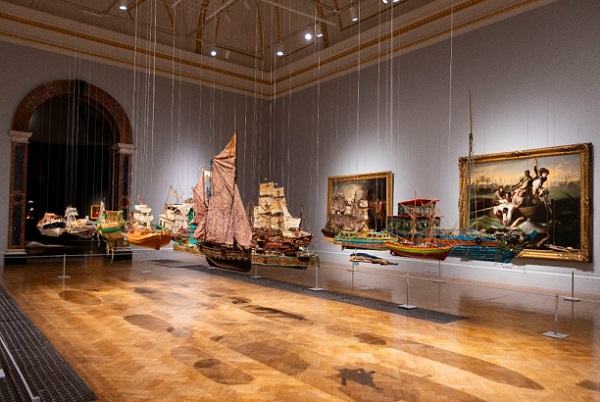
Jo Lawson-Tancred (Artnet) reviews “Entangled Pasts: Art, Colonialism and Change”–presently on view at the Royal Academy in London through April 28, 2024. She writes, “Works by a Frank Bowling, Kerry James Marshall, and Lubaina Himid are shown alongside historical paintings a documents that reveal the academy’s own historically white bias.” Shown above is the installation view of Hew Locke’s “Armada” (2017–19) [photo by David Parry].
We are fortunate enough to live in a time when many contemporary artists are reckoning with the past and making heard the once suppressed voices of people of color, women, and members of the LGBT+ community. Often, however, representations of the white- and male-focused histories being redressed are physically absent from exhibitions of such works.
Not so at the Royal Academy’s “Entangled Pasts: Art, Colonialism, and Change” in London. Here, historical documents of empire, systemic exclusion, and outright racism are shown side-by-side with monumental works by some of the U.K.’s leading contemporary artists like Frank Bowling, Yinka Shonibare, Isaac Julien, Sonia Boyce, and Lubaina Himid. Other major headliners include El Anatsui, Kerry James Marshall, Kara Walker, Betye Saar, and of course, Tavares Strachan’s majestic public sculpture in the museum’s courtyard.
The role of art in shaping convenient narratives and promoting those with power is exemplified by many of the historical paintings on show. The American artist John Singleton Copley was an Academician known to have owned enslaved people and among his works in the show is a double portrait of a plantation owner’s daughters Mary and Elizabeth Royall (ca. 1758). His painting Watson and the Shark (1778) thrilled audiences when it was first shown at the RA for its depiction of a shark attack in Havana harbor, imbuing Britain’s activities across the Atlantic with a sense of heroic excitement.
These canvases form the backdrop to the exhibition’s standout work, Hew Locke’s Armada (2017–19), a suspended fleet of ships. These intricately detailed, colorful vessels represent various moments in history, from the Mayflower that brought early colonizers to America in the 1600s to the cruise liner HMT Empire Windrush, which carried Caribbean passengers to a new life in the U.K. in 1948. Local economies are represented by shipping boats while cargo ships are synonymous with modern-day global trade networks.
Landscapes by the 18th century English painter William Hodges are typical for their era in how they depict places like the Caribbean and India as exotic, untouched idylls that bear no trace of colonial violence. [. . .]
Most staggering of all, however, is the fact that the first Black member to be elected to the Royal Academy was Frank Bowling in 2005.
In this exhibition, his majestic canvas Middle Passage (1970) is an abstracted meditation on the horrors of the transatlantic slave trade. Yellows, oranges, and greens refer to his birthplace of Guyana and we can make out the faint but familiar outlines of Africa and the Americas. It is staged in conversation with El Anatsui’s Akua’s Surviving Children (1996), in which pieces of driftwood are assembled to imply a gathering of figures. The sculpture was made while the artist was in Copenhagen for a conference on the Danish slave trade, during which he discovered pieces of wood washed up on a beach that brought to mind the many people who had been torn from their homeland and enslaved.
For full article, see https://news.artnet.com/art-world/black-history-at-center-of-ra-show-2428949
[Shown above: PHOTOS by David Parry © Royal Academy of Arts, London; All Rights Reserved, DACS 2024. First, installation view of the “Entangled Pasts, 1768–now. Art, Colonialism and Change” at the Royal Academy of Arts, London, showing Hew Locke, Armada (2017–19). Second: El Anatsui’s Akua’s Surviving Children (1996), courtesy of the artist and October Gallery, and Frank Bowling, Middle Passage (1970).]
Jo Lawson-Tancred (Artnet) reviews “Entangled Pasts: Art, Colonialism and Change”–presently on view at the Royal Academy in London through April 28, 2024. She writes, “Works by a Frank Bowling, Kerry James Marshall, and Lubaina Himid are shown alongside historical paintings a documents that reveal the academy’s own historically white bias.” Shown above is the installation view








